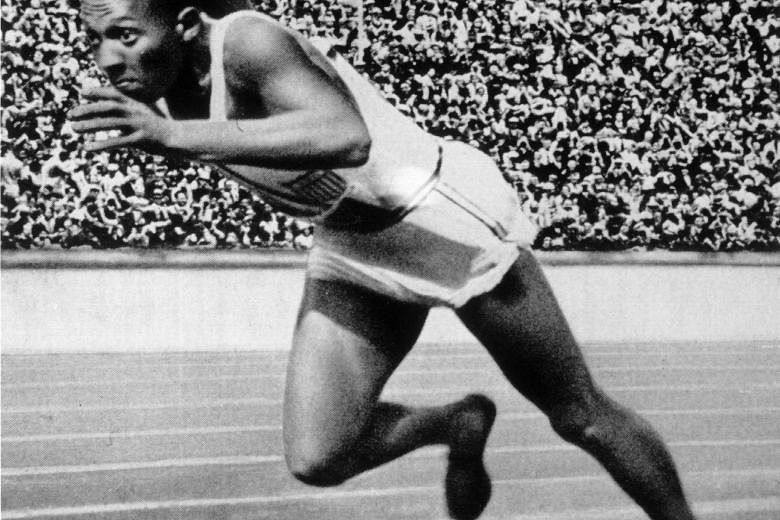LONDON • Jesse Owens is about to win his last race, after his family joined a three-pronged battle for the Olympic icon's legacy.
Now an 80-year-old story will be exhumed, and it may have Middle America shifting uneasily in its seat.
The son of a share-cropper, Owens famously won four Olympic titles in Berlin in 1936, and legend has it that, with his Aryan beliefs belittled, Adolf Hitler refused to shake hands with him.
It is one myth that will be exposed in Race, an upcoming biopic film about Owens, who died 35 years ago.
Last year, one of his gold medals, sold by the estate of the third wife of Hollywood tap dancer Bill "Bojangles" Robinson, fetched US$1.47 million (S$2.06 million) at auction, making it the most expensive piece of Olympic memorabilia.
The Owens family expressed their "sorrow" at the sale and questioned the provenance of the medal.
Jesse's wife, Ruth, had said that the original medals were stolen and had been replaced, while another was lost when he donated it to the Freedom Train, which travelled around the United States as part of bicentennial celebrations in 1976.
It was another intriguing sub-plot to a life that has often been twisted to fit an idealised template.
Owens said that he was actually snubbed by his own president, Franklin D. Roosevelt, and not Hitler.
Avery Brundage, a Nazi sympathiser and president of the US Olympic Committee, then ended Owens' post-Berlin career by throwing him out of the Amateur Athletics Union.
Owens was forced into circus races against horses and worked as a playground janitor and petrol pump attendant before filing for bankruptcy.
His daughter, Marlene Owens Rankin, says that being involved in making Race has been hard because the family did not want a hagiography.
"We were very concerned that history wasn't rewritten," she said. "Certain information gets to be accepted as historical fact when it isn't. We do not get involved with things we're not comfortable with."
So, what of the so-called snub?
There is no doubt that the Nazi hierarchy was displeased by Owens' four-medal haul - "white humanity should be ashamed of itself", Joseph Goebbels, the Nazi propaganda minister, wrote in his diary - but Marlene says that there was no refusal to shake hands.
"I don't think he ever felt he was snubbed by Hitler," she said.
"He knew that Hitler might have been greeting other athletes who were medal-winners, and he knew that Hitler said he would greet everyone or no one, but he did not feel individually snubbed. And I don't think he really cared, frankly."
The lack of an invitation to the White House cut a deeper wound.
"In retrospect, that bothered him more," Marlene said.
Several years ago Siegfried Mischner, a veteran German journalist, jolted the story into new life when he claimed that he saw Hitler shake hands with Owens behind a stand in the Olympic Stadium.
He also claimed that Owens carried a photograph of the greeting and, in the 1960s, tried to get journalists to rewrite a historical wrong. Nobody was interested.
"Jesse always had a good relationship with Germany from the time that he was in the Olympics," Marlene said. "They embraced him. I'm not sure people know how much they respected who he was and what he accomplished.
"It's partly true that he was treated better in Europe. He was admired by the black community in the USA, but given the racial divisions it was not as open-armed."
Race, which has a cast including Jeremy Irons, William Hurt and Stephan James in the Owens role, has just brought its release date forward to early next year to beat the other contenders.
With a reported three films on Owens to be shown in an Olympic year, it may get harder still to pick the fact from the fiction of arguably the Games' greatest story.
THE TIMES, LONDON

